Issue Archive
Table of Contents
BLOOD COMMENTARIES
REVIEW ARTICLE
The immune landscape and response to immune checkpoint blockade therapy in lymphoma
CME
In this month’s CME article, the authors review the pattern of response to checkpoint inhibitors in lymphoma, dividing lymphoma subtypes into “inflamed” lymphomas (eg, Hodgkin lymphoma and primary mediastinal B-cell lymphoma), which have high response rates to PD-1 inhibition, and “noninflamed” lymphomas (eg, follicular lymphoma and diffuse large B-cell lymphoma), which do not.
MYELOID NEOPLASIA
Prospective assessment of NGS-detectable mutations in CML patients with nonoptimal response: the NEXT-in-CML study
Acquisition of BCR-ABL kinase domain (KD) mutations is an important cause of tyrosine kinase inhibitor (TKI) resistance in chronic lymphocytic leukemia (CML). Soverini et al demonstrate that next-generation sequencing (NGS) for KD mutations markedly increases detection of low-level mutations over Sanger sequencing, potentially allowing earlier change to an alternative TKI to decrease the risk of treatment failure.
Mutational profile and benefit of gemtuzumab ozogamicin in acute myeloid leukemia
Clinical Trials & Observations
Brief Report
RED CELLS, IRON, AND ERYTHROPOIESIS
Antibodies against the erythroferrone N-terminal domain prevent hepcidin suppression and ameliorate murine thalassemia
Iron overload in thalassemia syndromes is caused in part by suppression of hepcidin by erythroferrone (ERFE). Arezes and colleagues demonstrate that antibodies against the N terminus of ERFE block hepcidin suppression and elucidate the mechanism by which ERFE suppresses hepcidin transcription.
THROMBOSIS AND HEMOSTASIS
Protease activity in single-chain prekallikrein
Ivanov et al elucidate a novel function of the putatively inactive zymogens of prekallikrein and factor XII, demonstrating that the zymogens both have background proteolytic activity that permits them to reciprocally activate one another.
TRANSPLANTATION
Pathogenic Bhlhe40+ GM-CSF+ CD4+ T cells promote indirect alloantigen presentation in the GI tract during GVHD
Granulocyte-macrophage colony-stimulating factor (GM-CSF) has been identified as a mediator of gastrointestinal (GI) inflammation in graft-versus-host disease (GVHD). The authors identify a specific subset of T lymphocytes that secrete GM-CSF and promote gut inflammation, linking innate and adaptive immunity and offering a potential therapeutic target to treat GI GVHD.
LETTERS TO BLOOD
Prevalence and disease predisposition of p.A91V perforin in an aged population of European ancestry
Clinical Trials & Observations
In a population-based analysis including a large database restricted to patients over age 70, the authors demonstrate that the A91V polymorphism in the familial hemophagocytic lymphohistiocytosis–related gene is a nonpathological polymorphism that confers no increase in cancer, death, or immunopathology.
BLOOD WORK
CONTINUING MEDICAL EDUCATION (CME) QUESTIONS
-
Cover Image
Cover Image
![issue cover]()
Photomicrograph of liver from a mouse with graft-versus-host disease showing characteristic portal tract inflammation. Mice transplanted with Bhlhe40−/− T cells develop liver pathology but have markedly reduced gastrointestinal tract inflammation due to reduced GM-CSF production. See the article by Piper et al on page 568.
- PDF Icon Front MatterFront Matter
- PDF Icon Table of ContentsTable of Contents
- PDF Icon Back MatterBack Matter
- PDF Icon Editorial BoardEditorial Board
Advertisement intended for health care professionals
Email alerts
Advertisement intended for health care professionals


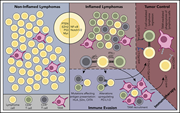
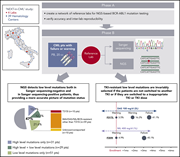
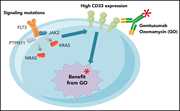
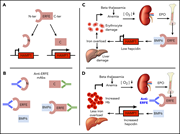
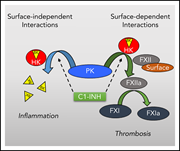


What’s NEXT for CML-NGS mutation screening